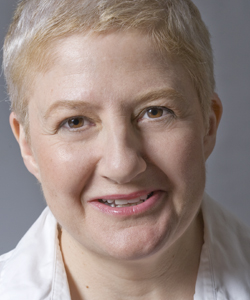Join a community of readers who are committed to Jewish stories
Sign up for JBC’s Nu Reads, a curated selection of Jewish books delivered straight to your door!
Earlier this week, Donna Minkowitz wrote about how Judaism became the foundation for her memoir Growing Up Golem: How I Survived My Mother, Brooklyn, and Some Really Bad Dates. She has been blogging here all week for Jewish Book Council and MyJewishLearning.
 My mother always told us she could do magic. And though my sisters and I were modern children of the ’70s, brought up by this very same mother to be lefties and intellectuals, we believed her — all the way into early adulthood. She was that powerful a figure to us.
My mother always told us she could do magic. And though my sisters and I were modern children of the ’70s, brought up by this very same mother to be lefties and intellectuals, we believed her — all the way into early adulthood. She was that powerful a figure to us.
She said her beloved bubbe and zaide had taught her the potent, sometimes scary elements of Jewish magic — part of the “folk Kabbalah,” I would later learn — that allowed her to predict the future, interpret dreams, and — did she actually say this, or was it extrapolated by me as a frightened five-year-old listening? — manipulate the world to her liking.
As an older child, I once boldly asked her to teach me “the signs” she mentioned so often, by which she could read the future. She refused, saying “Once you know them, you’ll see them everywhere, and it will terrify you.” I couldn’t imagine anything more terrifying than her warning.
Still, part of me was incredibly intrigued. “Magic” was the thing I myself most wanted to do from an early age, and J. R. R. Tolkien became my favorite writer at the age of nine (and remains my favorite today). Fantasy and sword-and-sorcery were among the genres I loved the most, but I had never heard of any Jewish sorcerers or magicians until my mother mentioned them.
One of the most surprising things my mother told me about her early magical education was that it mixed Jewish enchantments with magic derived from the European pagan tradition. My mom said her Romanian bubbe taught her not just spells from our landsmen but “Romanian gypsy magic,” which frankly shocked me because what I had always heard of relations between Jews and their non-Jewish neighbors in Europe seemed to preclude friendly cultural exchange.
(Yes, I now find it funny that I found the claims about magic easy to believe, but I was more doubtful about amiable exchange of myths between Jews and goyim.)
One of the things I remember most pointedly from my three years of yeshiva is Abraham being revered for smashing the idols of pagans, and the almost unbearable horror of the Greeks’ turning the Jewish Temple into a pagan one (on the occasion in the 2nd century B.C.E. that gave rise to Chanukah).
Even as an adult, my understanding of Jewish and pagan contacts in the homelands of my grandparents (Russia, Romania, and Austria) was that there never would have been much merry sharing of stories, traditions, or magic. Each side, I thought, regarded the other with too much distaste and even hatred.
I’m delighted to have discovered I was wrong. When I researched the histories of the golem legend and of Jewish magic itself for my memoir, Growing Up Golem, I learned that there was, in fact, cultural intermingling going on for centuries. No less an authority than Gershom Scholem writes of pagan, Christian and Jewish elements intermingling in some traditions associated with the Kabbalah, and the late scholar Joshua Trachtenberg, in a fascinating work called Jewish Magic and Superstition, discusses enthusiastic sharing going back millennia (and continuing into the modern era). In fact, alchemy, Kabbalah, and Gnosticism have been crossing paths and borrowing from one another for many hundreds of years.
I’m proud to be part of a culture where Jewish difference turns out to be based in part on a cultural soup that got its nutrients from many places, where purity turns out to have been less important than a vital intercourse and commingling, one that gave rise to the legend of the golem itself.
Donna Minkowitz’s most recent memoir, Growing Up Golem: How I Survived My Mother, Brooklyn, and Some Really Bad Dates, will be published by Magnus Books on September 25th. She won a Lambda Literary Award for her first memoir, Ferocious Romance: What My Encounters with the Right Taught Me About Sex, God, and Fury. She has written for The New York Times Book Review, Salon, and The Nation. Read more about Donna here.